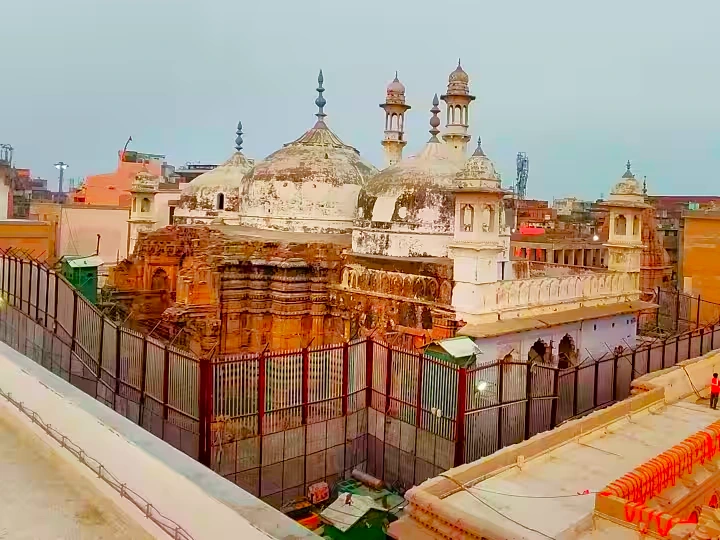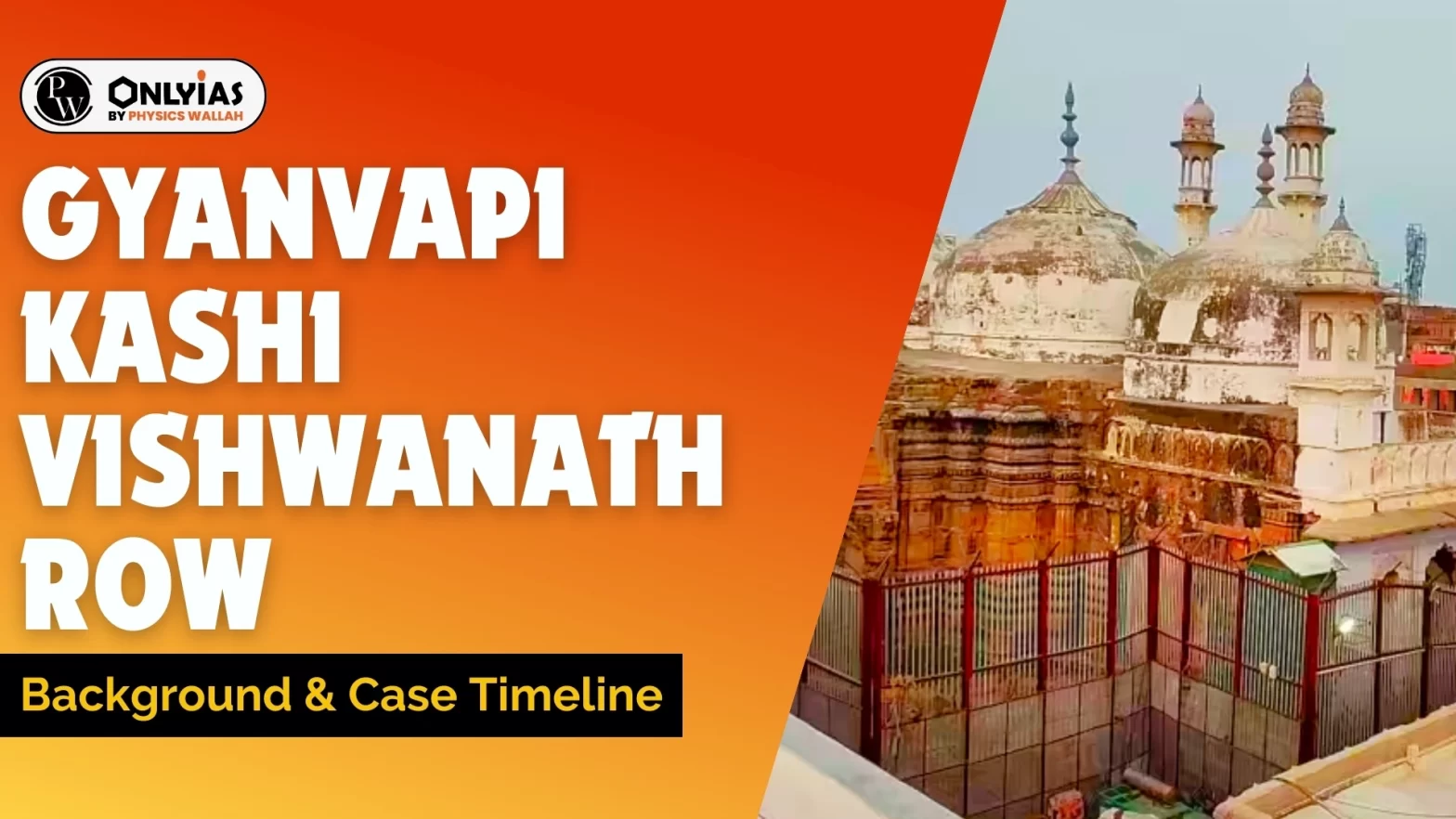Context: This article is based on the news “Gyanvapi case: Allahabad HC orders speedy trial, says 1991 suit not barred by law” which was published in the Indian Express. Allahabad High Court discarded the petition filed by the Gyanvapi Mosque Committee and UP Central Sunni Waqf Board and permitted suit seeking the temple’s restoration at the Mosque site.
Allahabad High Court Orders Speedy Trial in 32-year-old Gyanvapi Case
- In a significant judgment paving the way for the beginning of the trial of the Gyanvapi Mosque ownership dispute, the Allahabad High Court rejected five petitions challenging the civil suits pending in the Varanasi district court, which sought the restoration of Temple at the Mosque site.
- A single bench of the court also directed the Varanasi district court to complete the trial of the civil suits filed in 1991 and sought ownership of the disputed place and the right to worship there within 6 months.
- According to the court, a civil suit seeking control of the disputed place was maintainable and was not barred by the Places of Worship (Special Provisions) Act 1991.
- The court said that the dispute was not between two parties and that it affected two large communities and was of national importance.
- The high court further asked the trial court to place the report of the Archaeological Survey of India (ASI), which conducted a scientific survey of the Gyanvapi Complex and submitted the survey report in a Varanasi district court recently, and also ordered a fresh survey of the premises if required.
About Gyanvapi-Kashi Vishwanath Row
Background:

- Kashi Vishwanath: It is a prominent temple dedicated to the Hindu deity Shiva located in Varanasi, Uttar Pradesh.
- The temple stands on the western bank of the river Ganga, and is one of the twelve Jyotirlingas (holiest Shiva temples).
- The main deity is known by the name Vishvanatha or Vishveshvara meaning Ruler of The Universe.
- Varanasi city is also called Kashi, and hence the temple is popularly called Kashi Vishvanath Temple.
- Gyanvapi Mosque: It is located in close proximity to the Kashi Vishwanath Temple.
- Recent petitions claim that the Gyanvapi mosque lies on the remains of the ‘original’ Kashi Vishwanath temple.
- According to the available historical record, it was built in the 17th century on the orders of the Mughal emperor Aurangzeb.
- Dispute: The dispute involves claims by some Hindu groups regarding the Kashi Vishwanath Temple and the adjacent Gyanvapi Mosque, asserting that the mosque was built on the site of a Hindu temple.
- Scholars opined that the Gyanvapi mosque Stands on the desecrated Aadi Vishveshwar Nath temple.
- Legal battles and discussions have taken place over the years regarding the matter.
Must Read: Indefinite State Control Of Hindu Temples Is Unjust
Timeline of the Gyanvapi Case
- 1991: The first petition of the case was filed by Swayambhu Jyotirlinga Bhagwan Vishweshwar in Varanasi court in 1991 expressing three demands
- Declare the entire Gyanvapi complex as a part of the Kashi temple.
- Removal of Muslims from the complex area, and
- Demolition of the mosque.
- 1998: Another case was filed by Anjuman Intezamia Masjid Committee (AIMC) which approached the Allahabad High Court, asserting that a civil court could not decide the dispute between the temple and mosque as it was not permissible by the law.
- As a result, the High Court stayed the proceedings for 22 years.
- 2019: The case was revived when Vijay Shankar Rastogi filed a plea in the Varanasi Court demanding an Archaeological survey of the disputed area.
- 2020: This plea further encouraged the Anjuman Intezamia Masjid Committee to oppose the petition seeking an ASI survey of the entire Gyanvapi complex. In the same year, the petitioner approached the lower court for the resumption of the hearing of the 1991 petition.
- 2021:
- March 2021: The Places of Worship Act 1991 was taken up by a bench in the Supreme Court to examine its substantiality.
- August 2021: A few devotees filed a petition in the Varanasi Court seeking permission to worship deities inside the premises of Gyanvapi.
- September 2021: In the judgment given by a single judge bench of Allahabad High Court, it was announced that the court should wait for further judgement in the already proceeding cases of the matter.
- 2022:
- April 2022: Varanasi court appointed an advocate commissioner and ordered a videography survey of the complex. The order was challenged in the Allahabad High court, which upheld the order of the lower court.
- May 2022: The videographic survey of the Gyanvapi complex began and all the survey findings were submitted in a report to the court. The case proceedings were transferred to a district judge by the apex court.
- October 2022: Varanasi district court rejected the plea for carbon dating of the shivling claimed to have been found in the Gyanvapi mosque.
- November 2022: The supreme court agreed to set up a bench to hear the case.
- 2023:
- May 2023: Allahabad High Court ordered the determination of the age of the Shivling using modern technology. Supreme Court defers scientific survey to determine the age of Shivling.
- July 2023: Varanasi district court directs the ASI to conduct the survey including excavations, wherever necessary. Allahabad HC extended the stay implemented by SC on the ASI’s survey.
- August 2023: Allahabad HC allows scientific survey of Gyanvapi premises in the interest of justice. AIMC moves Supreme Court challenging the Allahabad HC. Supreme court refused to stay the ASI survey , except the ‘wuzukhana’ area where a ‘shivling’ was claimed to have been.
Current Situation
- Setting a six-month deadline for completion of proceedings before a Varanasi court, the Allahabad High Court has dismissed five petitions, saying the 1991 original suit is not barred by provisions of the Places of Worship (Special Provisions) Act, 1991.
Places of Worship Act, 1991
- As per the act, the conversion of the religious character of a place of worship, which existed on 15 August 1947 is prohibited.
- The act mandates that the nature of all places of worship, except the Ram Janmabhoomi-Babri Masjid that was then under litigation, shall be maintained as it existed on August 15, 1947.
- The Act was also meant to apply to the disputed Kashi Vishwanath temple-Gyanvapi mosque complex in Varanasi and the Krishna Janmabhoomi temple-Shahi Idgah mosque in Mathura.
- According to the Supreme Court, the Act is a legislative intervention that preserves non-retrogression as an essential feature of our secular values.
|
Challenges Associated with Gyanvapi-Kashi Vishwanath Row
- Religious Sensitivities: The dispute involves two religious communities, Hindus and Muslims. Any resolution needs to take into account the sentiments of both communities to avoid further religious tensions and conflicts.
- Such disputes affect communal harmony in the country having high potential to increase hatred.
- Legal Complexity: Court cases and legal proceedings have been ongoing for an extended period. Resolving the matter requires careful consideration of legal principles and adherence to the rule of law.
- For instance, under the ongoing dispute, the Places of Worship Act itself came under challenge at the Supreme Court.
- Political Dimensions: The political actors may exploit the issue for various reasons. While addressing the concerns of the communities involved poses a significant challenge, this might be used as an opportunity to influence potential vote banks by various political parties and leaders.
- Community Harmony: The dispute can potentially impact the social fabric and harmony between different communities.
- For instance, the current dispute has led to a polarized atmosphere leading to division and mistrust between Hindu and Muslim communities, further aggravated by irresponsible statements by various political and social actors.
- Public Opinion: The representatives of the majority Hindu community hold the opinion that there cannot be a compromise on three major issues viz. Ram Janmabhoomi temple, Krishna temple in Mathura and Kashi Vishwanath. While representatives of the Muslim community oppose the claims of the Hindu community and are against making a compromise.
- Preservation of Heritage: Regardless of the resolution, preserving the cultural and historical heritage of the region is crucial. The challenge lies in finding a solution that respects the historical significance of the site while addressing the concerns of the communities involved.
Way forward for Gyanvapi-Kashi Vishwanath Row
- Legal Adjudication: There is a need to continue the legal process and adjudicate the matter based on historical evidence, archaeological findings, and legal principles.
- For instance, like in Ayodhya, where the apex court cleared the way for the Ram temple, the law will take its course. The constitutional sanctity and legitimacy of due process is crucial to resolving the conflict.
- Further, what will be the religious character of the disputed place can only be arrived at by the competent Court after the evidences are led by the parties to the suit.
- Mediation and Dialogue: A mediated dialogue involving representatives from both Hindu and Muslim communities can provide a platform for open communication, understanding, and negotiation.
- Historical and Archaeological Research: Encourage unbiased research to shed light on the disputed site’s historical context, which can contribute to a more informed and evidence-based resolution.
- Political Neutrality: Encourage political leaders and parties to take a neutral stance on the issue and avoid politicizing the dispute for electoral gains and instead focus on finding a solution that promotes communal harmony.
- Implementation of the Resolution: Once a resolution is reached, ensure its effective implementation with the involvement of relevant stakeholders in a clear and transparent manner which can help build confidence in the resolution process.
Conclusion:
Peaceful Coexistence can be a middle path which emphasizes the importance of peaceful coexistence between different religious communities and foster understanding, tolerance, and respect for diversity.
- Maulana Abul Kalam Azad promoted unity and understanding among communities, along with fostering creativity from within.
Must Read: Parliamentary Panel Report on Archaeological Survey of India


